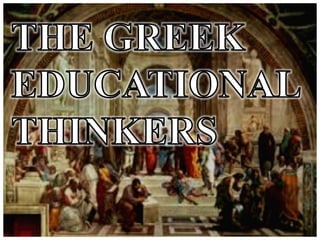
The greek educational thinkers
- 2. As a result of the Persian War, there was a great expansion of all aspects of human life throughout Greece. Athens became the center of trade and commerce taking full advantage of acquiring wealth and prestige A new class of teachers arose called the SOPHISTS
- 3. The Sophists Very learned, well- traveled men, usually non- citizens of Athens Offered a totally new perspective in learning Emphasized the art of speaking, taught declamation and oration, developed grammar and rhetorics as well as critical and reflective thinking
- 4. PROTAGORAS- chief of the Sophists believed that “MAN ISTHE MEASURE OF ALLTHINGS” and stressed individual development Based their philosophy on the doctrine of relativity of the truth- emphasizing individualism Knowledge and truth are both dependent on judgements by the individual The Pythagorean concept of unchanging mathematical relationship s as the essence of reality and the Eleatic principle that nature obeys laws of permanent being , that the laws of physics are permanent
- 5. They inquired whether or not such unchanging laws of nature could be accepted as the basis for laws governing man. Assert that moral principles and legal codes are relative – shook the foundations of society Turned their concern to the art of debate, techniques for convincing and or converting one’s opponent because of unavailability of absolute truth The deep interest in grammar was motivated by the desire to manipulate to serve personal ends- interest was in winning the argument rather than prevailing the truth
- 6. Why was this disliked? 1. Collection of fees for anything that a student might learn from them 2. They were aliens in Athens- posing threat leading the students to deviate from the moral, ethical, social, political and religious traditions of the Athenians 3. The strong emphasis on individualism- might lead for self- aggrandizement and personal glory leading to the downfall of the foundation of Athenian society
- 7. The Greek Educational Thinkers Dilemma ?????????
- 8. Socrates (469- 399 BC) Accepted the fundamental principle of Protagoras Postulated the concept Gnothi Seauton or know thyself, for knowledge is a virtue and all virtuous actions are based on one’s knowledge. Known for his Socratic Method a.k.a. Dialectic Method
- 10. - He was fond of asking thought provoking and at times unanswerable questions - IRONIC ELEMENT- asking series of questions to contradict an original statement - MAEIUTIC ELEMENT- asking series of questions conceiving the correct idea concerning the argument unconscious ignorance clear and reasoned truth
- 11. 1. Show that knowledge is the basis of all right actions, including the art of living 2. Develop the power of correct thinking upon the individual
- 12. Taught the dialogues of Socrates Advocate a government which he considered as aristocratic socialism- State must control everything and has the right and authority to determine who should be married With handicaps and disabilities should not be permitted to procreate Family life should be abolished deciding whether the child should live or not Educational system was designed to accommodate both sexes and was the determiner of the social classes of the people
- 13. 3 Distinct Classes of Society 1. PHILOSOPHICALCLASS ( Guardian of the Society) - devoted to the pursuit of knowledge, whose virtue was wisdom and whose duty was to rule the people 2.WARRIOR CLASS - devoted to warfare, whose virtue was honor, whose duty was to protect and defend the people according to the direction of their rulers
- 14. 3. ARTISAN or INDUSTRIAL CLASS - devoted to trade and crafts, whose virtue was money- making, whose duty was to obey and support the other two classes This may eventually lead to social justice Membership in the class should be determined by intelligence, virtues and abilities
- 16. Plato’s Educational System Age Bracket Educational Training Corresponding Social Class 0-7 Physical, Moral, Religious Artisan 7-16 Literature, Music, Gymnastics Artisan 16-20 MilitaryTraining Warrior 20-30 ScientificTraining Philosophical
- 17. At the age of 30- those who failed to show extraordinary talents remained given subordinate positions, those who excelled were given the highest level of education- “ PhilosophicalTraining” ( Philosophy, Law, Logic, Dialectic and Leadership) At the age of 35- they enter public service as administrators At the age of 50- they retire from active service
- 18. Aristotle ( 384- 322 B.C.) Denied the basic tenet of Socrates and Plato that knowledge is virtue- insisted that virtue is brought about by doing and not by knowing Man is a social animal- he must use his reason and live according to his reason to attain his ultimate end SUMMUM BONUM- “ supreme good” Stressed that reason functions when it controls conduct
- 19. Educational Ideals All outlined in his scientific treatises called Ethics and Politics Advocated that democracy is the government that would lead to the promotion and protection of the general welfare of the citizens The responsibility of the state is the provision for quality education for her citizenry- in turn will secure the welfare of the state Family should be strengthened providing the first educational experience of the individual
- 21. body and soul are not two separate elements but are one thing. Aristotle does not allow for the possibility of the immortality of the soul.The soul is simply the form of the body, and is not capable of existing without the body.The soul is that which makes a person a person rather than just a lump of meat!Without the body the soul cannot exist.The soul dies along with the body.
- 22. Age Bracket Educational Training Birth- 7 Basic education at home in preparation for formal schooling 7-20 Formal schooling Physical development- not only physical strength but also self restraint and control of passion and desire 21 and above Scientific and philosophical training
